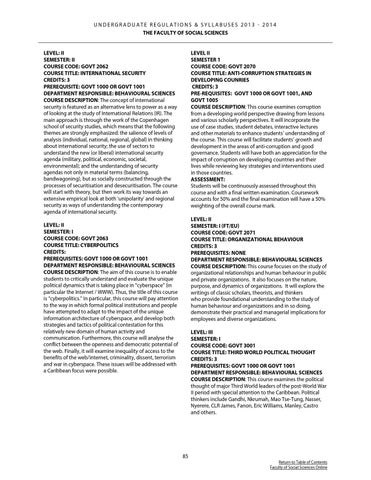UNDERGRADUATE REGULATIONS & SYLLABUSES 2013 - 2014 THE FACULTY OF SOCIAL SCIENCES LEVEL II SEMESTER 1 COURSE CODE: GOVT 2070 COURSE TITLE: ANTI-CORRUPTION STRATEGIES IN DEVELOPING COUNRIES CREDITS: 3 PRE-REQUISITES: GOVT 1000 OR GOVT 1001, AND GOVT 1005 COURSE DESCRIPTION: This course examines corruption from a developing world perspective drawing from lessons and various scholarly perspectives. It will incorporate the use of case studies, student debates, interactive lectures and other materials to enhance students’ understanding of the course. This course will facilitate students’ growth and development in the areas of anti-corruption and good governance. Students will have both an appreciation for the impact of corruption on developing countries and their lives while reviewing key strategies and interventions used in those countries. ASSESSMENT: Students will be continuously assessed throughout this course and with a final written examination. Coursework accounts for 50% and the final examination will have a 50% weighting of the overall course mark.
LEVEL: II SEMESTER: II COURSE CODE: GOVT 2062 COURSE TITLE: INTERNATIONAL SECURITY CREDITS: 3 PREREQUISITE: GOVT 1000 OR GOVT 1001 DEPARTMENT RESPONSIBLE: BEHAVIOURAL SCIENCES COURSE DESCRIPTION: The concept of international security is featured as an alternative lens to power as a way of looking at the study of International Relations (IR). The main approach is through the work of the Copenhagen school of security studies, which means that the following themes are strongly emphasized: the salience of levels of analysis (individual, national, regional, global) in thinking about international security; the use of sectors to understand the new (or liberal) international security agenda (military, political, economic, societal, environmental); and the understanding of security agendas not only in material terms (balancing, bandwagoning), but as socially constructed through the processes of securitisation and desecuritisation. The course will start with theory, but then work its way towards an extensive empirical look at both ‘unipolarity’ and regional security as ways of understanding the contemporary agenda of international security.
LEVEL: II SEMESTER: I (FT/EU) COURSE CODE: GOVT 2071 COURSE TITLE: ORGANIZATIONAL BEHAVIOUR CREDITS: 3 PREREQUISITES: NONE DEPARTMENT RESPONSIBLE: BEHAVIOURAL SCIENCES COURSE DESCRIPTION: This course focuses on the study of organizational relationships and human behaviour in public and private organizations. It also focuses on the nature, purpose, and dynamics of organizations. It will explore the writings of classic scholars, theorists, and thinkers who provide foundational understanding to the study of human behaviour and organizations and in so doing, demonstrate their practical and managerial implications for employees and diverse organizations.
LEVEL: II SEMESTER: I COURSE CODE: GOVT 2063 COURSE TITLE: CYBERPOLITICS CREDITS: PREREQUISITES: GOVT 1000 OR GOVT 1001 DEPARTMENT RESPONSIBLE: BEHAVIOURAL SCIENCES COURSE DESCRIPTION: The aim of this course is to enable students to critically understand and evaluate the unique political dynamics that is taking place in “cyberspace” (in particular the Internet / WWW). Thus, the title of this course is “cyberpolitics.” In particular, this course will pay attention to the way in which formal political institutions and people have attempted to adapt to the impact of the unique information architecture of cyberspace, and develop both strategies and tactics of political contestation for this relatively new domain of human activity and communication. Furthermore, this course will analyse the conflict between the openness and democratic potential of the web. Finally, it will examine inequality of access to the benefits of the web/internet, criminality, dissent, terrorism and war in cyberspace. These issues will be addressed with a Caribbean focus were possible.
LEVEL: III SEMESTER: I COURSE CODE: GOVT 3001 COURSE TITLE: THIRD WORLD POLITICAL THOUGHT CREDITS: 3 PREREQUISITES: GOVT 1000 OR GOVT 1001 DEPARTMENT RESPONSIBLE: BEHAVIOURAL SCIENCES COURSE DESCRIPTION: This course examines the political thought of major Third World leaders of the post-World War II period with special attention to the Caribbean. Political thinkers include Gandhi, Nkrumah, Mao Tse-Tung, Nasser, Nyerere, CLR James, Fanon, Eric Williams, Manley, Castro and others.
85 Return to Table of Contents Faculty of Social Sciences Online
